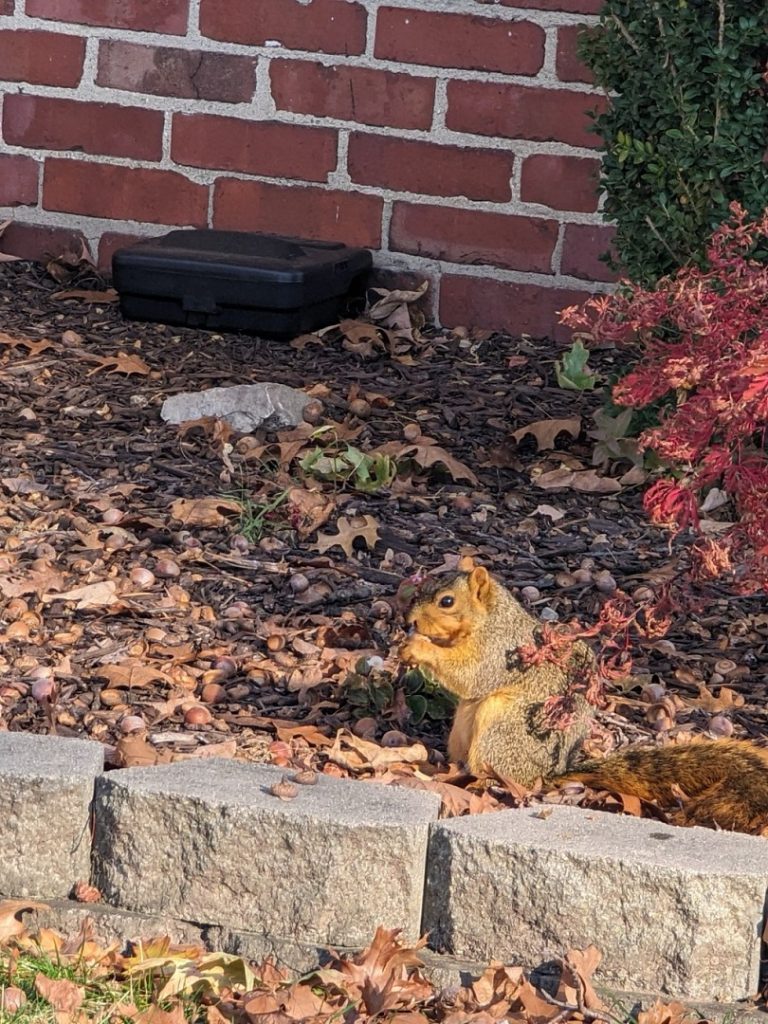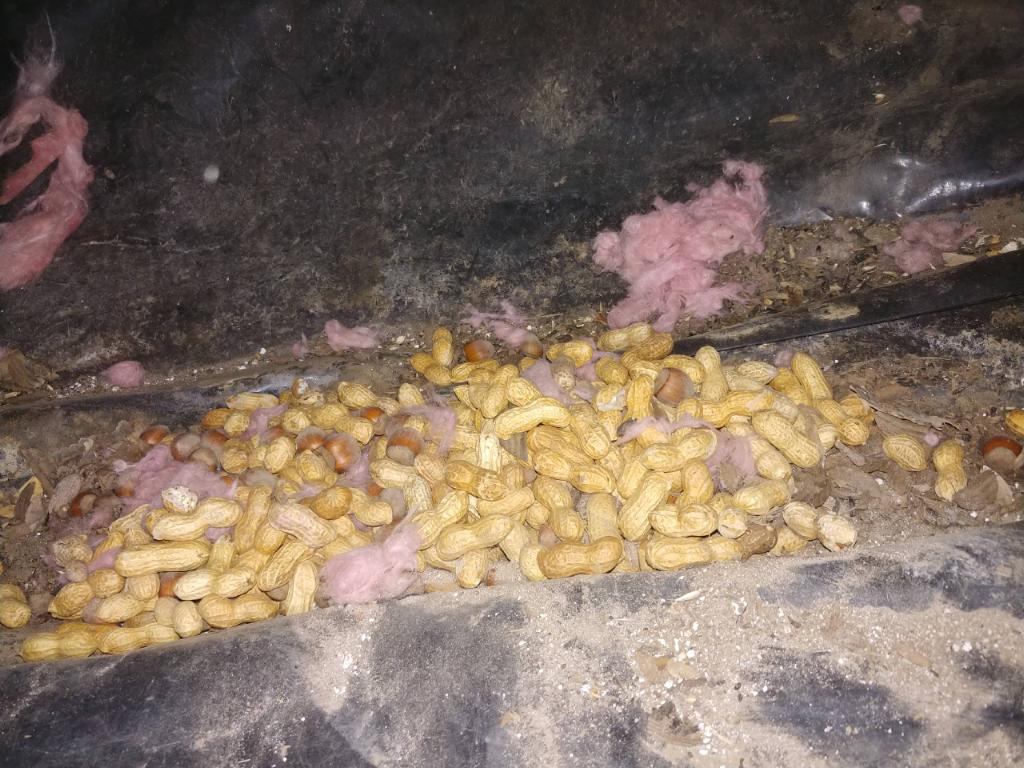
A squirrel’s diet contains various food items, including leaf buds, wild fruits, nuts, acorns, bird eggs, and tree bark. However, while they appreciate readily available natural foods, they’re opportunistic feeders that will forage in various places, including your property.
Unfortunately, this can lead them to seek food and shelter in and around your home. Since the squirrel’s life cycle is about five to six years and they reproduce rapidly, one or two squirrels in your home can quickly lead to an infestation. Squirrels in homes can cause extensive property damage and create a health hazard due to the feces and urine they leave behind.
If you suspect your house has become home to squirrels, it’s important to contact a professional wildlife removal service to safely and humanely remove them. Critter Control specializes in humanely removing squirrels from properties, so if you’re experiencing an infestation, we can help.
Are you attracting squirrels to your property?
Find a Critter Control near you
What Do Squirrels Eat?
Squirrels are opportunistic feeders with varied diets. These little rodents’ diets vary based on the time of year. Many species of tree squirrels store pieces of food for later consumption.
Common Squirrel Food Sources:
- Leaf buds
- Fruits such as apples, cantaloupe, grapes, strawberries, watermelon, blackberries, blueberries, raspberries
- Nuts like acorns, hazelnuts, pecans, peanuts, hickory nuts
- Vegetables like broccoli, carrots, peas, yellow squash, zucchini
- Bird eggs
- Seeds like pumpkin seeds, sunflower seeds,
- Tree bark
When given the opportunity, squirrels will participate in food theft and snack on human leftovers and garbage.
However, a squirrel eating human food (especially junk food) can be a problem. Foods like dairy, chocolate, salted nuts, and bread can contain high amounts of sugar, salt, and other ingredients that cause various issues for the squirrel, such as weight gain, dental issues, metabolic bone disease, and similar health problems.
Where Do Squirrels Look for Food?
Squirrels will forage for their food in a wide variety of places, especially where they can easily find food. Hardwood forests with mature oak, hickory, elm, and maple trees are a favorite spot because of their abundance of foraging opportunities, and the same is true of nut and fruit orchards.
Gardens and farm fields full of fruits, vegetables, seeds, and grain crops are another popular pick, favored by these rodents for the ample and easily accessible food options. You might even spot squirrels stealing seeds from your backyard bird feeder, provided they can shimmy their way up to the feeder.
Squirrels also flock to public parks and university campuses where food scraps are plentiful, and garbage cans are readily available for scavenging.
Should You Feed Squirrels in Your Backyard?
You should not feed squirrels. Feeding squirrels or providing food sources for squirrels can make you more susceptible to a squirrel infestation. Squirrels nest in locations close to food and water that provide adequate shelter and security. If they find a reliable food source, they will start to look for a safe place for shelter.
Where Do Squirrels Eat?
Squirrels usually hide their food, a practice called hoarding, to eat at a later date. They either hide their nuts in many locations (scatter hoarding) or one central location (larder hoarding). Typically, squirrels scatter hoard by burying their nuts in different places. They can larder hoard when they have a safe place to deposit their collections.
Scatter hoarding
This type of hoarding involves multiple caches of food stored in various locations. With scatter hoarding, the squirrel relies on its memory and search strategies to find and collect the hidden food before other squirrels do.

Larder hoarding
When a squirrel stores all its food in one or a few central locations, it’s called larder hoarding. Often, the squirrel defends these locations, protecting its cache to ensure it has food for later in the season.

On their quest to find food on your property, your home may catch their eye as a safe, secure place to nest and hoard their food. That can lead them to a place in your home, such as your attic, where they can enjoy a safe spot to store their food, build a nest, and gain security from predators.
Unfortunately, squirrels in your attic or squirrels in your wall are a serious problem, given that they can cause significant property damage that is expensive to repair.
Should You Feed Squirrels in Your Backyard?
You should not feed squirrels. Feeding squirrels or providing food sources for squirrels can make you more susceptible to a squirrel infestation. Squirrels nest in locations close to food and water that provide adequate shelter and security. If they find a reliable food source, they will start to look for a safe place for shelter.
What Are the Signs of a Squirrel Infestation?
Signs of a squirrel infestation include abnormal noises, such as scampering, scratching, or gnawing sounds, droppings in and around your home, scratches or claw marks in and around entry points, and finding acorns or nuts in your attic or roof.
If you find piles of nuts in and around your home, they’re almost always brought by a squirrel. So, this is one of the primary signs of an infestation, especially if you find those caches in your attic or roof.
If all signs point toward a squirrel infestation, it’s best not to attempt to DIY the squirrel removal process. Squirrels are wild animals, so if they feel threatened or are protecting their young, they may attack or attempt to escape. Instead, contact a professional wildlife removal service to safely remove the squirrels from your home and property.
Prevent a Squirrel Infestation
Removing squirrel food goes a long way to prevent a squirrel infestation.
- If you have oak trees in your yard, limiting acorns might not be feasible. But during the fall, cleaning up acorns can help reduce food sources in your yard.
- Protecting your bird feeders from squirrels with baffles and cleaning up spilled bird seed can help prevent squirrels in your yard.
- Securing garbage cans.
- Feeding pets inside.
- Protecting your fruit and vegetable gardens with bird netting can keep squirrels out.
Contact Critter Control for Professional Squirrel Removal
If squirrels have taken up residence in your home, Critter Control can help. Our experienced technicians have extensive experience in efficiently and humanely removing squirrels from homes. So, if you’re seeing piles of nuts in your attic or roof and other signs of a squirrel infestation, contact us today for help evicting your unwanted houseguests. Or, find and contact the office nearest you
Learn more about squirrel removal.
Get them out.
Keep them out.®
Experiencing a wildlife or pest issue? We can help! Complete this form and your local Critter Control® office will contact you to assist.
- How to Get Rid of Squirrels
- Squirrels Entering Homes
- Squirrels in Attics
- Squirrels in Chimneys
- Squirrels on Roofs & in Soffits
- Squirrels in Walls
- Squirrels in Ventilation
- Squirrels in Gutters
- Squirrels in Crawl Spaces
- Squirrels in Yards or Gardens
- Squirrels in Trees
- Squirrels Digging Holes in the Ground
- How to Identify Squirrel Sounds
- Squirrel Tracks
- Squirrel Droppings
- Squirrel Trapping
- Squirrel Repellents & Deterrents
- Squirrel Appearance & Identification
- Species & Types of Squirrels
- Squirrel Life Cycle
- Baby Squirrels
- Squirrel Nest
- Dead Squirrels
- Diseases That Squirrels Carry
- Rabid Squirrels
- Do Squirrels Hibernate?
- Gray Squirrels
- Do Squirrels Bite?
- Squirrel Damage to Your House
- Squirrels vs. Rats
- Squirrels vs. Chipmunks